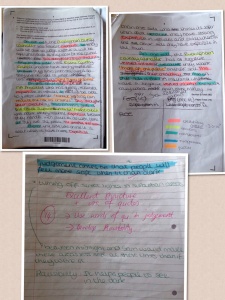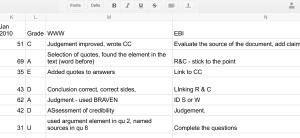Having seen someone else blog on how they use exam papers in class, I thought I’d share what I do with them. Apologies for those that want scientific evidence based research with multiple testing and effect sizes. I do this kind of thing by instinct and so far it’s ‘worked’.
I teach a subject that is 100% exam so being confident in the exam is part of the way to succeed. It is a skills based exam so may be different to others but I’m sure this could be adapted. It is also a subject for which there are many old papers. I will have to rethink when the new specifications come out.
I have always given students a past paper within the first few lessons. The quicker they see what they are aiming for, the better. Sounds boring but on the whole they appreciate it. I’ve heard students say in April that they’ve not ever seen a paper for their subject. Professional suicide in my opinion!
This year, I, like many have had to rethink how I teach AS with the abandonment of January exams. I teach a two unit AS. In the past it’s been simple, teach unit 1 do the exam, teach unit 2, do the exam.

How learning(?)was organised with January exams. Notice the dip once the exam was done.’Fine’ if no re-sit needed.
I was very concerned that having to learn two units for the summer would be tough so I changed to this.

Whilst the lesson focus in January turned to unit 2 content the learning continues in unit 1 due to exam paper completion.
I decided to teach the content in the same order and roughly to the some timing however, I believe that I have managed to use exam papers to ensure that the students don’t forget unit 1. Here is how I’ve done it:
- Virtually every lesson from October to January involves one or more exam question. Early in the term, applying what they’ve learnt in each lesson is important to their understanding of how the content ‘works’.

How lessons are structured over unit 1. Not quite the study:test:test:test:test model but my version of it.
- This builds up to about December where I start giving them whole papers to complete for homework, once a fortnight. (I teach them once a week)
- They hand them in the next lesson and we swap papers and peer mark (in red pen) all the questions that are the simpler right/wrong answers. I’ve found that my AS group this year have done this very well. There’s plenty of ‘banter’ but I hear them discussing in depth the mark scheme which they must understand to be able to mark the question. If there is a question they’re unsure of how to mark they either leave it or write “*Miss Cox” which indicates to me to double check. Peer marking has worked very well with them. They’ve on the whole seen how to answer a question by looking at someone else’s paper, if they themselves have got it wrong or weren’t sure how to write it.
- They then get their own paper back and if we have time, we use highlighters on the longer questions which I need to mark. They allocate a colour for each particular aspect they need to include. I often hear ‘oh no’ when they realise what they missed out. This self realisation I think is part of the process.
- This is then handed in for me to mark. I do this for the next lesson. Then for the first part of the next lesson we ‘green pen’ the work. Our school have green pens for students to write in when they make improvements (DIRT). What they green pen will depend on my feedback and their targets from the last paper (explained below). In this time I can speak with students about any errors send things they’ve improved on.
- After the green pen time they then have to create two targets for themselves. Two things that if they’d done them they’d have gained more marks or would have helped the examiner in the marking of their script.
- I give them their paper for the next homework and they write these two targets on the front of the new paper. These are the things they must remember to do next time.
- I then, in front of the class get each student to tell me their two targets. I type them live on my Google sheet for the class. This is deliberate. It ensures the targets are realistic and meaningful as possible, it makes them verbalise them which hopefully means they understand what they’re saying and it also creates an atmosphere in class where they have to be silent and listen.
- They then have until next lesson to complete and the cycle starts again.
I keep a record of their targets and whether they met them.
There have been occasions where they all have a particular area to practice so alongside the next paper they have to completely re-do one of the longer questions, taking note of what they did wrong the first time.
So far I’ve not had a student repeatedly have the same targets. They tend to ‘master’ something and then move on.
I have also done this with my A2 student and I have seen her skills develop and her marks increase on a paper by paper basis. She can also really clearly see this happening in front of her. If she does what she didn’t do last time then she will improve!
Over the Easter holidays I haven’t told students to ‘revise’, I’ve just given them papers that they must complete. Completing the papers IS revision itself. There are only a few things they can revise discretely in my subject.
As I’ve blogged before I truly believe that if students are taking exams we are doing them a real disservice if we do not fully expose them to exam papers. Success in most GCSEs and A Levels come to being able to complete an exam correctly. My aim is that students are so sick of completing exam papers that the actual exam becomes second nature to them. If you call this teaching to the exam then ‘Yes’ I teach to the test. However I have also evaluated the impact of this method of teaching/learning and it would seem that anecdotally the learning has actually stuck and students have applied their learning in their further studies and work life.
Results are good,they enjoy their learning and they learn for life. I think that’s my job done.



